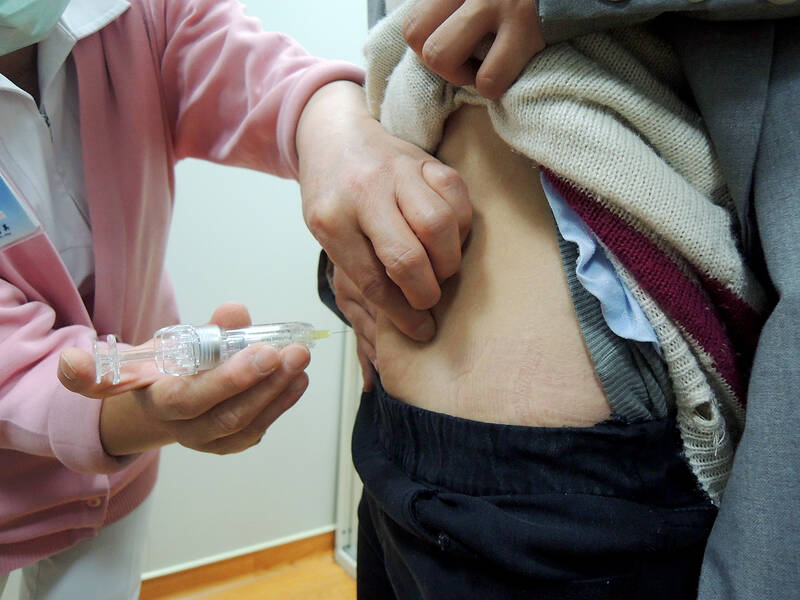New policies from the Ministry of Health and Welfare are to go into effect tomorrow, including expanded subsidies for in-vitro fertilization (IVF), the creation of urgent care centers and the next phase of government-funded vaccinations.
Under the latest IVF program, women younger than 39 would be eligible for a maximum subsidy of NT$150,000 (US$4,884) for their first treatment, and NT$100,000 for their second and third attempts, the ministry said.
Women aged 39 to 45 could get a subsidy of up to NT$130,000 for their first treatment, and NT$80,000 for their second and third attempts, it said.

Photo: Tsai Shu-yuan, Taipei Times
Those younger than 40 are eligible for a maximum subsidy of NT$60,000 during their fourth to sixth attempts, the ministry said.
Couples from low and lower-middle-income households could get a subsidy of up to NT$150,000 regardless of age or number of attempts, it added.
Women younger than 39 could have one embryo implanted, while those aged 39 to 45 may implant up to two embryos, it said, adding that the policy aims to protect the mother’s and the infant’s health.
The ministry said it is also introducing at-home care services to reduce hospital overcrowding, such as the Outpatient Intravenous Antibiotic Treatment Incentive Program, which would allow patients to receive antibiotic injections at home through portable infusion devices under a one-day payment scheme.
The program would also reduce the overuse of broad antibiotics and is expected to benefit about 10,000 people, it said, adding that it has allocated a NT$54 million budget.
Trial operations of an urgent care center program to reduce emergency room overcrowding is to begin tomorrow, the ministry said.
The National Health Insurance Administration (NHIA) said 13 urgent care centers across six major cities would be open from 8am until midnight on Sundays and national holidays.
Medical appointment fees at the centers would initially be NT$150 per visit, it said, adding that the centers are designed to care for people in need of urgent but noncritical care, or triage levels 3 to 5.
Patients with more critical or complex needs, or under triage levels 1 or 2, would be fast-tracked to larger hospitals, the NHIA said.
The centers would be staffed with general practitioners from primary care clinics and would have basic equipment, such as X-ray machines, delivery kits, suture kits and defibrillators, it said.
The NHIA said it expects to treat 36,000 people per year, adding that an estimated NT$280 million budget has been allocated for the centers until next year.
The ministry said the second phase of government-funded COVID-19 and influenza vaccinations is to begin tomorrow, and would be available to people aged 50 to 64 who do not have high-risk chronic conditions.
The expanded criteria for doctors to prescribe influenza antiviral medicines, which was due to end today, would be extended to Nov. 15, it added.

The disruption of 941 flights in and out of Taiwan due to China’s large-scale military exercises was no accident, but rather the result of a “quasi-blockade” used to simulate creating the air and sea routes needed for an amphibious landing, a military expert said. The disruptions occurred on Tuesday and lasted about 10 hours as China conducted live-fire drills in the Taiwan Strait. The Civil Aviation Administration (CAA) said the exercises affected 857 international flights and 84 domestic flights, affecting more than 100,000 travelers. Su Tzu-yun (蘇紫雲), a research fellow at the government-sponsored Institute for National Defense and Security Research, said the air

Taiwan is to commence mass production of the Tien Kung (天弓, “Sky Bow”) III, IV and V missiles by the second quarter of this year if the legislature approves the government’s NT$1.25 trillion (US$39.78 billion) special defense budget, an official said yesterday. Commenting on condition of anonymity, a defense official with knowledge of the matter said that the advanced systems are expected to provide crucial capabilities against ballistic and cruise missiles for the proposed “T-Dome,” an advanced, multi-layered air defense network. The Tien Kung III is an air defense missile with a maximum interception altitude of 35km. The Tien Kung IV and V

Trips for more than 100,000 international and domestic air travelers could be disrupted as China launches a military exercise around Taiwan today, Taiwan’s Civil Aviation Administration (CAA) said yesterday. The exercise could affect nearly 900 flights scheduled to enter the Taipei Flight Information Region (FIR) during the exercise window, it added. A notice issued by the Chinese Civil Aviation Administration showed there would be seven temporary zones around the Taiwan Strait which would be used for live-fire exercises, lasting from 8am to 6pm today. All aircraft are prohibited from entering during exercise, it says. Taipei FIR has 14 international air routes and

Taiwan lacks effective and cost-efficient armaments to intercept rockets, making the planned “T-Dome” interception system necessary, two experts said on Tuesday. The concerns were raised after China’s military fired two waves of rockets during live-fire drills around Taiwan on Tuesday, part of two-day exercises code-named “Justice Mission 2025.” The first wave involved 17 rockets launched at 9am from Pingtan in China’s Fujian Province, according to Lieutenant General Hsieh Jih-sheng (謝日升) of the Office of the Deputy Chief of the General Staff for Intelligence at the Ministry of National Defense. Those rockets landed 70 nautical miles (129.6km) northeast of Keelung without flying over Taiwan,